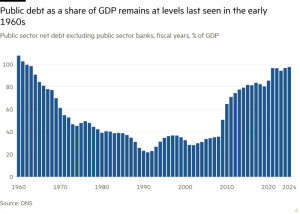UK unveils shake-up of financial compensation rules

Stay informed with free updates
Simply sign up to the UK financial regulation myFT Digest — delivered directly to your inbox.
The system for handling UK financial services complaints is to be overhauled to avoid more costly “mass redress events” in the latest sign of how politicians are pushing to ease the regulatory burden on the City of London.
The plans unveiled by the Financial Ombudsman Service and Financial Conduct Authority on Friday came hours after a call by chancellor Rachel Reeves on Thursday for the duo to improve how they handle “historic market practice and mass redress events”.
Reform of the financial services redress regime was part of a wider shake-up of City regulation outlined by the chancellor in her speech at the annual Mansion House dinner, as she declared that rules drawn up after the 2008 banking crash had “gone too far” and were stifling growth and risk-taking.
The FOS and FCA outlined several potential changes to the financial redress system on Friday, such as giving companies longer to respond to customer complaints and reducing the scope to appeal against ombudsman decisions. They invited feedback from the industry on their ideas and said they would present proposals in the first half of next year.
The two institutions were already in the spotlight over their handling of a surge in complaints for alleged mis-selling of car finance. This has disrupted the supply of loans to car buyers, threatened to overwhelm the FOS and forced the FCA to pause the complaints process.
Analysts have warned the controversy over car finance commissions could end up costing banks billions of pounds in customer redress, reviving memories of the £50bn they paid out for the payment protection insurance scandal.
David Postings, head of lobby group UK Finance, welcomed plans to reform the redress system, saying the FOS has “the potential to cut across the remits and rules of other regulators, making the regulatory landscape more complex and costly [and] we have long called for this to be looked at”.
Most of the recent complaints to the FOS over car financing have come via claims management companies, which handle cases for groups of consumers in return for a cut of any compensation and shot to prominence for their role in fuelling the PPI scandal.
The FOS said on Friday it would start charging fees for every case brought by claims managers and other professional representatives. They will have to pay £250 for every case they bring to the FOS after the first 10 each year, which would be lowered to £75 if it rules in their favour. Individual consumers would still have free access to the FOS.
“We have seen how large volumes of complaints in particular areas can impact the effectiveness of the system,” said James Dipple-Johnstone, deputy chief ombudsman at the FOS. “By further strengthening our work with the FCA and industry, we can identify and address these issues more promptly to ensure better outcomes for all.”
The FOS handles more than 200,000 cases a year brought by consumers whose complaints are rejected by financial services providers. It has experienced a 50 per cent increase in consumer claims in the year to June.
The regulators said it was “appropriate” for the FCA to give its interpretation of its rules to the FOS before it presides on cases with wider implications. But they added that more formal intervention powers for the FCA “could risk undermining the Financial Ombudsman’s statutory independence” and ability to promptly process cases.
The chancellor has written to both the FCA and the Bank of England’s prudential arm, calling on them to do more to support economic growth and improve the competitiveness of the financial services sector.
Reeves acknowledged the regulators had “difficult trade-offs to make” but said they should ensure “administrative burdens on firms are streamlined as far as possible, while maintaining high regulatory standards and a reputation as a responsive and agile regulator”.
In her speech on Thursday, she highlighted plans to reduce the burden of the regulatory certification regime for bank staff below senior management level, shorten the deferral period on bankers’ bonuses, encourage more financial advice and guidance and streamline the FCA’s rule book.
Financial trade groups welcomed the proposals, while suggesting other areas were also ripe for reform.
“The intention is clear and welcome,” said Miles Celic, chief executive of TheCityUK. “To secure the competitiveness of the UK’s capital markets, there is more to be done to modernise them,” he added, calling for measures to digitise share certificates and broaden participation in equity markets.
#unveils #shakeup #financial #compensation #rules







